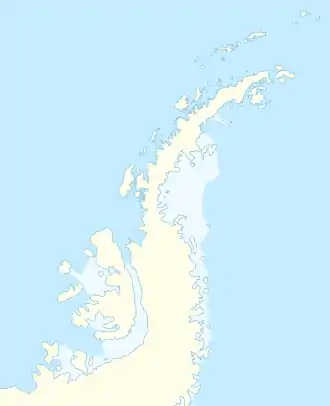Wolseley Buttress
Wolseley Buttress ist ein 1700 m hohes Felsmassiv im westantarktischen Grahamland. Es ragt am Südrand des Detroit-Plateau auf und flankiert den Westrand des Albone-Gletschers.
| Wolseley Buttress | ||
|---|---|---|
| Höhe | 1700 m | |
| Lage | Grahamland, Antarktische Halbinsel | |
| Gebirge | Detroit-Plateau | |
| Koordinaten | 64° 12′ 0″ S, 59° 48′ 0″ W | |
| ||
| Normalweg | Hochtour (vergletschert) | |
Der Falkland Islands Dependencies Survey erfasste es kartografisch von 1960 bis 1961. Das UK Antarctic Place-Names Committee benannte es 1964 nach der Wolseley Tool and Motor Car Company, die zwischen 1908 und 1910 den Motorschlittentyp entwickelte, der bei der Terra-Nova-Expedition (1910–1913) unter der Leitung des britischen Polarforschers Robert Falcon Scott zum Einsatz kam.
Weblinks
- Wolseley Buttress im Geographic Names Information System des United States Geological Survey (englisch)
- Wolseley Buttress auf geographic.org (englisch)
This article is issued from Wikipedia. The text is licensed under Creative Commons - Attribution - Sharealike. The authors of the article are listed here. Additional terms may apply for the media files, click on images to show image meta data.
